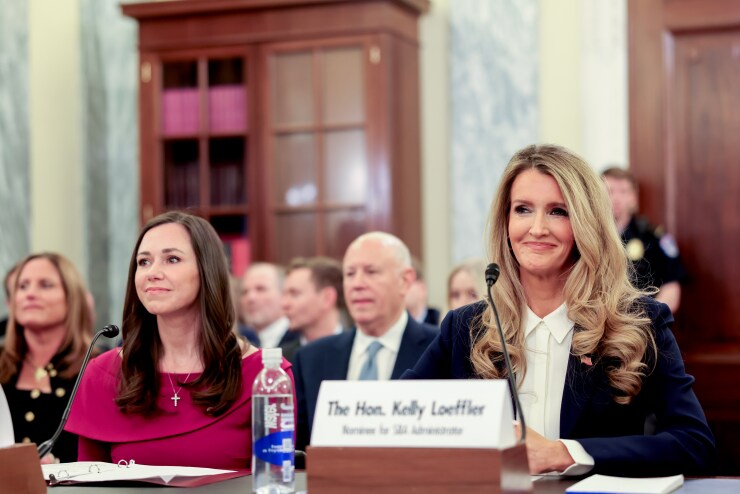
The Small Business Administration is freezing a program launched during the Obama administration, and later expanded under President Joe Biden, that was part of an effort to widen access to capital for entrepreneurs who are members of disadvantaged groups.
SBA Administrator Kelly Loeffler argued this week that the Biden administration botched the expansion of the 14-year-old Community Advantage program, leading to a surge of problem loans. Loeffler, who
The SBA is implementing a moratorium on further expansion of the Community Advantage program. It also signaled plans to require the program's existing lenders to meet significantly higher capital requirements as a condition of their continued participation.
"This Administration is putting a stop to reckless lending experiments and restoring safeguards to protect both taxpayer dollars and the integrity of the 7(a) loan program for America's entrepreneurs," Loeffler said Monday in a press release.
Community Advantage lenders generated a 7% default rate over the past year, according to the agency. Between Oct. 1 and April 30, a period that covers the first seven months of SBA's 2025 fiscal year, the program's 141 approved lenders made 820 loans totaling $134.4 million. That loan volume was up 28% from the same seven months in fiscal 2024.
Community Advantage's current default rate is twice that of the overall program's already elevated rate, according to Loeffler. The entire 7(a) program's default costs, which represent the money SBA pays lenders to honor its loan guarantees, jumped from $733 million in fiscal year 2022 to $1.1 billion in fiscal 2023. It rose further to $1.6 billion in fiscal 2024, which ended Sept. 30.
Loeffler unveiled the new Community Advantage policy less than two months after resuming efforts
The SBA typically waits until October, the start of its fiscal year, to adjust fees. Loeffler said the midyear change was required to cover
Community Advantage was launched as a pilot program in 2011 and is only open to nonbank lenders. The idea was to tap nonbank, mission-based lenders to make small-dollar 7(a) loans — the program's original maximum loan size was $250,000 — to companies that typically struggled to access capital, as well as startups, veteran- and minority-owned businesses and those operating and low- and moderate-income communities.
Though the program is not open to banks, banks have benefited from the ability to refer applicants they're unable to serve to Community Advantage lenders.
Congress never made Community Advantage permanent, it did extend the program's lifespan several times. In September 2023, the Biden Administration, under the leadership of then-Administrator Isabel Casillas Guzman, allowed Community Advantage to sunset — but not before creating a new type of 7(a) lender, Community Advantage small business lending companies, and shifting all existing Community Advantage participants into that category.
Biden's SBA leadership also increased the maximum loan size for the new category of lender to $350,000.
Conventional 7(a) lenders, including bank and credit union lenders, can make larger loans — up to $5 million. The SBA provides guarantees of 50% to 85% on 7(a) loans.
The 2023 changes to Community Advantage were part of a broader strategy,
While the Community Advantage program represented an exception to the moratorium, its lenders operated under restrictions on the types of borrowers they could serve, as well as the size of loans they could make.
Biden's SBA ultimately ended the moratorium completely in 2023, opening the 7(a) program to more conventional nondepository lenders, including fintechs. The goal was to further boost small-dollar lending, which was seen as a means of distributing more capital to minorities, women and other underserved entrepreneurs.
Under Guzman, the SBA allowed a total of six nondepository lenders to join the ranks of 7(a) lenders. While SBA has not formally reinstated the moratorium, no nondepository lenders have been approved under Loeffler's leadership.
This week, Congressional Republicans were quick to applaud the decision to freeze the Community Advantage program.
"SBA lending programs should be purely based on economic viability," Iowa Sen. Joni Ernst, the chair of the Senate Small Business Committee, said Tuesday in a press release. "I am relieved to see Administrator Loeffler continue to restore fiscal responsibility to the agency's flagship 7(a) lending program to ensure that taxpayers are not forced to foot the bill."
A spokesperson for Democrats on the House Small Business Committee did not respond to a request for comment before deadline. Likewise, a spokesperson for Massachusetts Sen. Edward Markey, the top Democrat on the Senate Small Business Committee, did not immediately provide comment.






